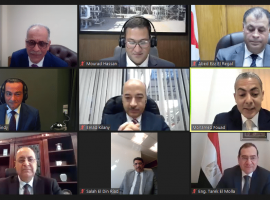Promoting diversity, capitalizing on female workforce and investing in mentoring and sponsoring their skillsets is an increasing concern within the oil and gas sector. With more women obtaining degrees in science, technology, engineering, and mathematics (STEM) and joining the energy sector, the workforce is slowly but surely becoming more balanced. In order to boost female participation and give women equal opportunities of building a successful career path, the industry has to ensure that female graduates are up-to-date and well trained, and emphasize how reskilling through a top-down approach can create a bigger impact.
Challenges Facing Young Women
Getting this whole new generation into the industry can be a challenging issue. Layla El Hares, General Manager Developments and Asset Manager at Shell Egypt thinks that most international oil companies (IOCs) have to focus on females from a young age in order to propel them into the field. “We all have to go to career fairs and target universities. I myself was hired in an Alexandria University fair and I did not know much about the oil and gas industry before that,” she explained.
There are higher percentages of girls taking up STEM subjects now more than ever, with 40% in Egypt compared to 32% in the US and Europe, according to Iman Hill, Energean Oil & Gas CEO. Although the feedstock is there, what happens is that they do not necessarily make it into their chosen fields due to societal, cultural or structural barriers. Those societal and cultural norms are constructed when some jobs are not seen as right for women. When they finally do get in, they face other internal challenges or structural barriers which have to do with the inclusivity of the organization.
Attracting more females to the oil and gas sector does not only depend on the mindset of young STEM female students, but also on the mindset of employers, who adhere to stereotypes and the unset or unconscious bias, according to Sameh Sabry, General Manager of DEA, a company that recently became one of the few in the sector chaired by a female CEO.
“We need to become more progressive, more transparent, and more equal when it comes to the selection of career opportunities,” he pointed out, adding that there is a tendency by recruiters to unconsciously select a profile that is more guaranteed or more likely to succeed, based on their previous experience. This simply means that in a male-dominated industry, it is always easier to select males over other qualified female candidates, who can be viewed as a risk.
Building a More Inclusive Future
The Middle East and North Africa (MENA) region has many opportunities for girls, believes Colby Fuser, Vice President of Halliburton in Egypt and Libya. “As leaders, our role is being an enabler. I need to make sure that I have every opportunity for every young professional that allows the best ones to succeed, putting in mind inclusion and diversity. It all comes down to how you want to build your team, and those teams are much stronger with better ideas from different people with different backgrounds,” Fuser said referring to his company’s employer research system that promotes women in energy.
To harness the collective power of any organization, mentorship should be at its heart. Each manager within the industry or any organization should set an example for their employees. Leigh-Ann Russell, Head of Global Procurement and Supply Chain Management at BP, talked during EGYPS about the importance of mentorship. “The help I have had has been fundamental for my career and now it is time to pay that forward. Now I mentor a lot of young women inside BP as well as outside the organization,” she said.
Direct mentoring, peer-to-peer mentoring, and reverse mentoring can be the most effective method for any organization to take it up a notch. “Get young people in your organization to come and teach you skills that you do not have. You are never too early in your career to mentor and never too old to be mentored. Find a mentor and be a mentor,” Russel added.
Human Resources as an Enabler
During EGYPS, Tamer Essam, Human Resources (HR) Vice President at Schneider Electric, stressed on how societal challenges can disrupt the HR process in hiring young females. “It all starts with the society we live in. As our society is still male-dominated, we have to challenge schools, teachers, and parents, and then we challenge managers. As HR management, we have to educate our managers, leaders, technicians, that [the oil and gas industry] is no longer considered as a “heavy industry”. Whatever you can do, she can definitely do,” he indicated.
Essem explained that an effective HR department should go to universities, keep an eye on the students who are interested in the industry, and attract them to the industry through internships or programs. “We also try to convince our education systems to be more challenging, to be more creative and more interesting for females,” he said.
But it is not always an HR discussion and the responsibility of HR solely. It is a discussion that the whole company should engage in, from the top management to the peers. So when a woman has a concern in her career, she can count on her colleagues.








